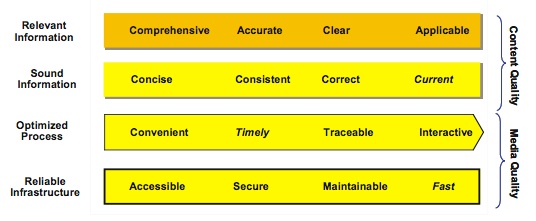What is Digital Information Quality: Difference between revisions
Jump to navigation
Jump to search
No edit summary |
No edit summary |
||
| Line 9: | Line 9: | ||
Source: [http://www.computing.dcu.ie/news/newsitems/sem2_04-05/info_quality/markus.pdf Eppler, M., Helfert, M., Gasser, U.: Information Quality: Organizational, technological, and legal perspectives, 2004.] | Source: [http://www.computing.dcu.ie/news/newsitems/sem2_04-05/info_quality/markus.pdf Eppler, M., Helfert, M., Gasser, U.: Information Quality: Organizational, technological, and legal perspectives, 2004.] | ||
[[Category:Digital Information Quality]] | |||
[[Category:Core Articles]] | |||
Latest revision as of 14:39, 27 November 2007
- Information quality refers to information that is fit for its intended use. E.g. correct, complete, unbiased, and coherent information would be considered as high quality information.
- A general definition of the term âinformation qualityâ is not suitable as the quality of information depends on the respective circumstances and the affected individuals.
- A number of normative and descriptive criteria can constitute a general framework to evaluate the quality of information in particular contexts. Sample:
